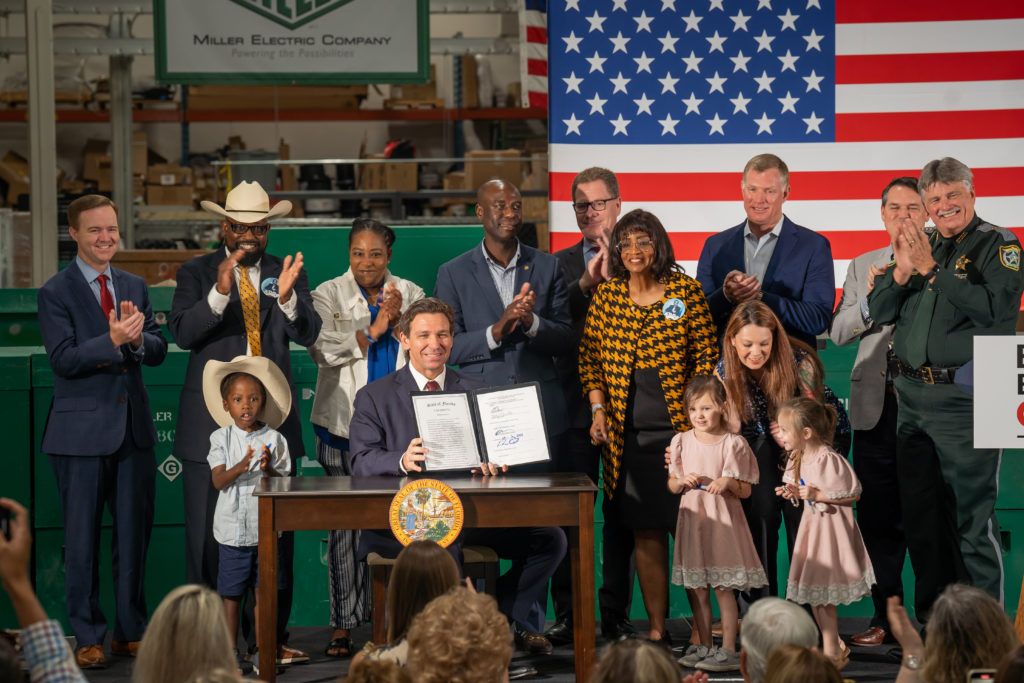By Frank Giles
The Florida Legislature passed a record budget of $116.5 billion as it wrapped up its work on May 5. It was an active session for agriculture. It also was a session in which Gov. Ron DeSantis was looking to score wins prior to announcing his run for president in 2024. DeSantis announced his presidential bid on May 24.

IMMIGRATION POLICY PASSES
Trying to shore up his credentials on immigration and border policy, DeSantis advocated for and signed into law SB 1718. Effective July 1, it will make using the E-Verify system mandatory for any employer with 25 or more employees. The law requires employers to document and report compliance annually. The law allows the Department of Employment Opportunity to impose a $1,000 per day fine on employers who violate the E-Verify mandate three times within a 24-month period. A host of other provisions in the new law are aimed at quelling undocumented immigration.
Given the reliance on migrant labor, specialty crop growers and agriculture groups registered concern about what implications the law might have on farming. Florida Commissioner of Agriculture Wilton Simpson told the News Service of Florida he agrees that action is needed to address the border crisis. He noted that while it might present challenges, he was confident industries would adapt. Simpson said he believes that when law-abiding citizens read the bill and get an understanding of it, they will follow it.
As with most legislation, there is language that needs more clarity and definition to sort out just how much it will impact agriculture. Labor shortages and immigration policy problems are not new to specialty crop growers, so the law is just another hurdle to navigate. That’s why the H-2A visa program for foreign labor has become so popular. Florida and Georgia lead the nation in using the program.
The Florida Fruit and Vegetable Association (FFVA) has been studying the legislation closely and its potential impacts. Jamie Fussell, director of labor relations for FFVA, said growers using H-2A should not worry.
“H-2A workers are not impacted by this law. The H-2A visa grants the beneficiary (the visa holder) work authorization, and employers verify an H-2A worker’s authorization as they would any other employee,” Fussell said. “Many H-2A employers already use the E-Verify system, and U.S. Citizenship and Immigration Services incentivizes the program’s use by allowing certain benefits for H-2A employers requesting extensions of stay.”
But Fussell added that didn’t stop inaccurate information from spreading soon after the legislation was signed. One social media post from opponents of the law showed what was purported to be a Florida strawberry field left without workers due to the legislation. The post didn’t acknowledge that the Florida strawberry season was already finished.
“Misinformation has spread throughout our communities, and we would encourage employers to proactively communicate with their workforces, whether H-2A or domestic. H-2A workers can be assured that their employment is not jeopardized by virtue of an employer using, or not using, E-Verify because they already have work authorization,” Fussell said.
Growers not using H-2A and employing migrant labor will need to follow developments with the new law to ensure compliance. It will take some time to sort out details on compliance and enforcement.
HB 1279 BENEFITS GROWERS
The Florida Department of Agriculture and Consumer Services (FDACS) capped off its first legislative session under the leadership of Commissioner Simpson with the passage of HB 1279. It had an identical partner in the Senate (SB 1164). The bill was signed into law by Gov. DeSantis in late May.
This wide-ranging legislation covers several areas impacting Florida farmers. One of the signature parts of the legislation was the creation of the Florida Farm TEAM (tax exempt agricultural materials) Card. Growers will be able to make tax-exempt purchases using the card, which reduces red tape and modernizes the current burdensome paperwork process, according to FDACS.
The legislation also requires state agencies and colleges to give preference to food commodities grown or produced in Florida when available, practical and feasible. The intention is to help increase demand for locally grown items.
The law also addresses definitions of fertilizer. Specifically, it will better define controlled-release and slow-release fertilizers. Under current law, both share the same definition but are different materials.
The new language defines controlled-release as engineered to provide nutrients at a predictable rate. Slow-release is described as releasing or converting to a plant available form nutrients at a slower rate relative to an appropriate reference soluble product. The law is intended to ensure clarity from product marketers and for grower consumers.
LAND OWNERSHIP LAW
SB 264,signed by the governor, restricts the role certain foreign countries may take with respect to land ownership in Florida. The bill restricts a governmental entity’s ability to contract with certain foreign countries of concern and further prohibits those countries, including China, from purchasing or otherwise acquiring real property in the state.
Notably, the bill prohibits a specified foreign principal from owning real property near a military installation and further prohibits the specified foreign ownership of agricultural land. Other states have passed similar legislation.
“Food security is national security, and we have a responsibility to ensure Floridians have access to a safe, affordable and abundant food supply,” noted Simpson. “China and other hostile foreign nations control hundreds of thousands of acres of critical agricultural lands in the United States, leaving our food supply and our national security interests at risk. Restricting China and other hostile foreign nations from controlling Florida’s agricultural land and lands near critical infrastructure facilities protects our state, provides long-term stability and preserves our economic freedom.”
Cutline: Gov. Ron DeSantis held a bill-signing ceremony for SB 1718 in Jacksonville prior to his announced bid to run for president. The new law has some concerned about impacts on farm labor.









